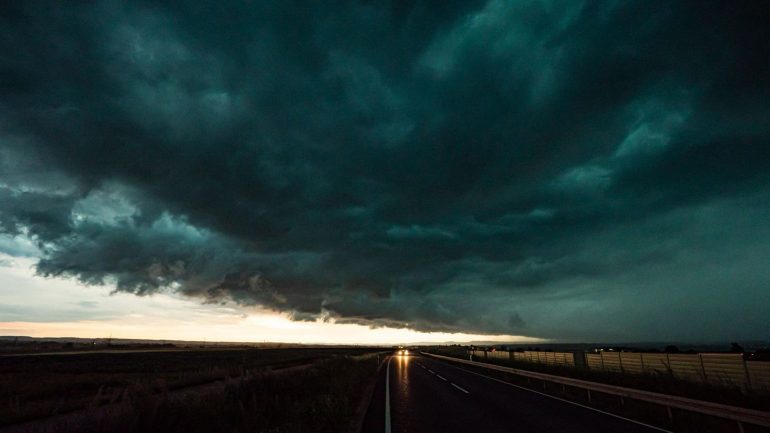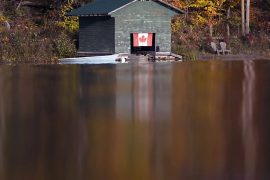climate crisis
Unprecedented heat in Canada: why extreme weather may not become the “new normal”

If it’s really hot, it’s best to stand or stand on the water. Earlier in the week, it also applied to people in Northwest Canada. In Calgary, bathers had to register for a 90-minute time slot to swim in a public outdoor pool. Vancouver residents on the Pacific also showed themselves a need to cool down. At senior centers, such as here in Edmonton, Alberta, staff are required to check residents hourly to prevent heat stroke. “We encourage our residents to take a nap or stay indoors during the hottest part of the day, then we close the shutters and watch movies,” said this employee of one facility. Weekend temperatures in some parts of Canada reached 40 degrees Celsius. The average temperature at this time of year in Canada is usually around 24 degrees.
Unprecedented heat in Canada, a full-blown tornado in the Czech Republic, hailstorms and heavy rain in Germany – not the result of an entire summer storm, but only a few days. The consequences of climate change are becoming increasingly noticeable.
The world is looking at Lytton right now. A small village in western Canada is literally the hotspot of an unprecedented heat wave that has also affected the neighboring northwestern United States. For two days in a row, a new heat record was set in Lytton for Canada: the most recent 47.9 degrees. Prior to this, this region of the world had never measured more than 45 degrees – and that was in 1937. “This is really shocking,” said Scott Duncan, a British meteorologist who has made an international name for himself as a chronicler of the extremes. weather events.
Note: Record heat affects an area known to have cooler temperatures than it actually is. Whether in Lytton, Seattle in the United States or Portland, Oregon, a little further south: it’s never been as hot as it is now. Throughout Seattle’s history, temperatures reached just under 100 degrees Fahrenheit in the first three days (just under 38 degrees Celsius), TV station reports CBS, now this mark has been crossed more clearly for three consecutive days. Above all, apartments here – similar to those in Germany – are rarely equipped with air conditioning as it is usually simply not necessary. In view of the scorching heat, affected cities are now providing air-conditioned halls and accommodation in which people can take shelter.
Extreme Weather: Tornadoes and Hail in Europe
Over the past few days, Scott Duncan has also distributed photos and videos from Germany through his social media channels; Particularly from the hurricane area to the southwest, which was again shaken by heavy rain and storms last night. with hail in Rottweil or Fussen. Not far from In Forggensee:
In addition: the French cities of Lyon and Reims in Spain also flooded with hail, evidence of unusual, sometimes catastrophic weather fronts – so-called super sails – especially in northern Europe, in Essex in the UK and tornadoes in the Czech Republic. The latter made headlines due to its sheer destructiveness and number of victims: five people were killed, 200 were injured. Meteorologist Jörg Kachelmann predicted that such a strong tornado in Germany would be only a matter of time. Even then there will be victims. The warmer and more humid climate favored the formation of these destructive local storms.
Climate researcher: “We knew it was coming”
Turbulent weather days such as the present one serve as solid evidence of the climate crisis. It is not just individual extreme weather events, but an increasing accumulation of them, Which, according to climate researchers, is clear evidence of global climate change happening before our eyes. But it has long been true: “Instead of simply saying that we know that extreme weather is on the rise, we can now calculate how much climate change has increased the likelihood of individual events”, so many years ago Susan Joy Hassol, director of the US Climate Communication Foundation, who has made it his business to communicate research results in an understandable way.
“I worked on climate projections for 25 years, so we knew it was coming,” Canadian climate researcher Katherine Hayhoe tweeted accordingly About record heat in his home country and in the US Northwest. The global ties are also clear for climate researchers: “The heat bell in the northwestern US is only part of a planet-wide wave pattern that engulfs the entire Northern Hemisphere,” explained Stefan Rahmstorf of the Potsdam Institute for Climate Impact Research, “Along with four red regions with northward air currents, and four blue regions with southbound air currents”. The system is clearly very stable at the moment. This is thought to be because – simply put – global warming may slow and, under certain circumstances, cause the jet stream in the atmosphere to come to a standstill. By “blocking” the flow of air in this way, the North Pacific would be continuously supplied with warm air.
Michael Mann: “Not the ‘new normal'”
Statistically, such a heat wave on the Pacific Coast is literally a millennium event, as American atmospheric researcher Jeff Berardelli explained to CBS. Climate models nonetheless correctly predicted that this makes heat important in relation to climate change. This allows the conclusion that such extreme constellations will occur more frequently in the future – with associated consequences.
Michael Mann, a pioneer in climate change research at Pennsylvania State University, was quoted by CBS as saying, “As long as we keep warming the planet from the burning of fossil fuels and CO2 emissions, we’re going to have more and more severe heat waves, droughts, wildfires.” of fire and flood.” Therefore, there is an urgent need to reduce the emission of greenhouse gases. But some people wanted to settle with it and would therefore speak of the “new normal”, according to Mann. But it’s not enough, “it’s worse.” The Intergovernmental Panel on Climate Change recently issued an urgent warning that the consequences of uncontrolled or uncontrolled climate change could threaten the continued existence of mankind.
Source: Twitter/Stephen Rahmstorf, Twitter/Katherine HiHohandjob Climate Facts (1)handjob Climate Facts (2)handjob Twitter/Scott Duncanhandjob CBS, dpa news agency

Devoted web advocate. Bacon scholar. Internet lover. Passionate twitteraholic. Unable to type with boxing gloves on. Lifelong beer fanatic.






